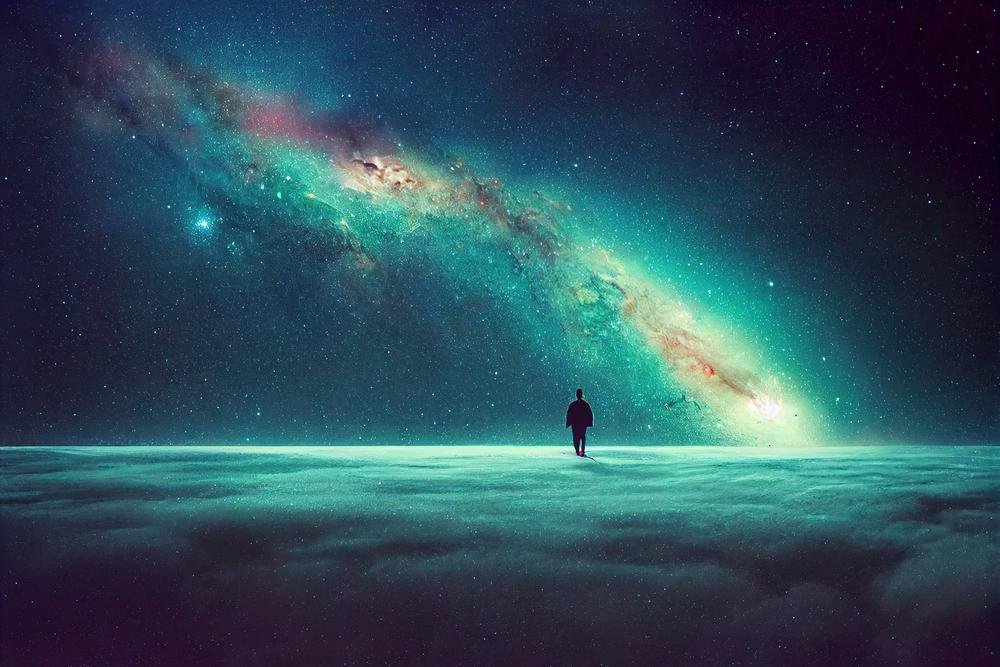*This text was written by a TecMundo columnist; finally learn more.
One of the most intriguing questions in humans is whether we are alone in our universe. More than 14 billion years from its inception and all this vastness is for us? Or are life forms other than terrestrial life accompanying us? Many scientists have tried and are still trying to answer this question. One of two possible answers could change humanity forever.
Perhaps the most successful attempt at an answer to spark this debate, and certainly the most famous among scientists, comes from the American astronomer Frank Drake. In 1961, he formulated an equation by which we could calculate the number of intelligent civilizations that exist in our galaxy and the entire universe if we knew all the parameters. The problem (obviously) is that until now we don’t know all the terms of such an equation. The best we can do is an estimate.
The Drake equation takes into account data known in astronomy, such as the annual rate of star formation in a given galaxy. For example, 1 to 3 new stars are born every Earth year in the Milky Way. Knowing how many stars are born each year is important as we understand that every new star can have new planets to orbit, and that the more planets there are, the more likely life is on one of them.
However, this equation also takes into account things we still don’t know, such as the percentage of habitable planets that have developed life at some point. Of course, the fact that we do not know the exact values of such terms does not prevent us from “estimating” an approximate value so that we can have an idea of how many civilizations other than our own may exist.
At the time of formulation, Drake and his colleagues estimated that there must be between 1,000 and 100 million civilized planets in the Milky Way alone! It is important to understand that this estimate relates not only to the number of planets capable of harboring any form of life, but to the number of planets that have not only life but also civilized life.
Currently, there is almost a consensus in the scientific community that this estimate is exaggerated. Current values are in the range of 1 to 15,000 planets that host or may have hosted a civilization. The fact that we are here must mean that the probability of civilizations existing in the universe is not zero, right? This is assuming we call ourselves civilized.
However, it is worth considering the hypothesis that while other intelligent civilizations may or may have existed in our galaxy and even in the universe, we will likely never come into contact with such lifeforms. It is not unreasonable to think that intelligent life forms can deplete their resources to the point of extinction. Something not far from the critical moment we live in to make our planet comfortably habitable.
For us Brazilians, living mostly in the southern hemisphere, global warming is not something that will happen in the future. It is already responsible for the significant increase in storms and extreme weather events. This could, for example, be the start of a series of changes that will affect our entire way of life and the way we produce food.
Therefore, before the question of being alone in the universe is even answered, it serves to increase the thought and understanding that it is very rare for us to be here in one way or another. The least we can do is value and preserve what we have before we even consider looking for other places or ways of life.
Rodolfo Lima Barros SouzaProfessor of Physics and columnist Technology World🇧🇷 He holds a master’s degree in Physics and Science and Mathematics Teaching in Public Perception of Science from Unicamp. Available on social networks as @rodolfo.sou.
Source: Tec Mundo
I am Bret Jackson, a professional journalist and author for Gadget Onus, where I specialize in writing about the gaming industry. With over 6 years of experience in my field, I have built up an extensive portfolio that ranges from reviews to interviews with top figures within the industry. My work has been featured on various news sites, providing readers with insightful analysis regarding the current state of gaming culture.












